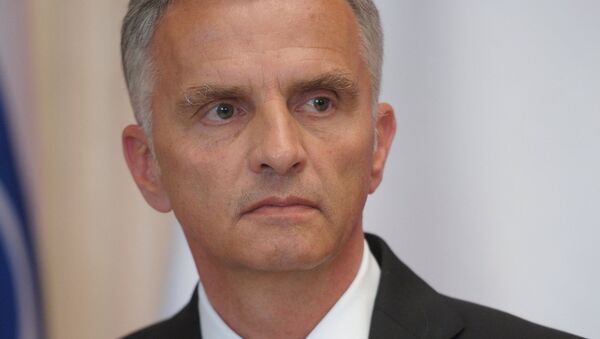VIENNA, November 1 (RIA Novosti) — Local elections in Donetsk and Luhansk People’s Republics (DPR and LPR) are not in line with the Minsk protocol, and could hinder arrangements implementation, Organization for Security and Co-operation in Europe (OSCE) Chairman-in-office Didier Burkhalter said, according to an official statement, published on the OSCE website.
“Referring to the repeated reports on intentions of the self-proclaimed entities of Donetsk and Luhansk to hold so-called elections outside the framework set by the Ukrainian law, he [Didier Burkhalter] noted that such action runs counter to the letter and spirit of the Minsk Protocol and would further complicate its implementation,” the OSCE statement said.
Burkhalter once again stated that following the Minsk Protocol and the Memorandum is the only way to stabilize the situation in eastern Ukraine.
“He [Didier Burkhalter] concluded by underlining that full and unconditional implementation of the Minsk Protocol and the Memorandum remains essential to advance political stabilization and to establish broad support for the economic rehabilitation of the conflict zone,” the statement said.
In February, after Ukraine underwent a regime change and new authorities came to power, the LPR and the DPR refused to recognize legitimacy of the new government. Based on the results of the referendums held in May, where a vast majority of voters supported independence, the two republics declared their sovereignty in a move that triggered a violent confrontation between LPR and DPR militia and Kiev-led forces.
On September 5, following months of bloodshed, a ceasefire was reached during a meeting of the Contact Group on Ukraine in Minsk, with a Memorandum, specifying steps for the ceasefire implementation being adopted on September 19. In addition, Kiev agreed to adopt a law giving the Donetsk and Luhansk regions special statuses for three years and ensuring early local elections there.
However, the heads of the DPR and the LPR want full independence for the whole territory within the borders of the respective administrative entities in Ukraine. Both self-proclaimed republics have set elections of regional leaders and legislative bodies for November 2.



